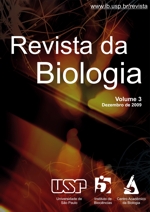SERIA A TEORIA DA EVOLUÇÃO DARWINIANA DOMÍNIO EXCLUSIVO DOS BIÓLOGOS? IMPLICAÇÕES DA EVOLUÇÃO BIOLÓGICA PARA AS CIÊNCIAS HUMANAS
DOI:
https://doi.org/10.11606/issn.1984-5154.v3p1-5Palavras-chave:
História da biologia, Humanidades, Sociedade, Interdisciplinaridade.Resumo
A teoria evolutiva darwiniana tornou-se o atual paradigma nas ciências biológicas desde a formulação da teoria sintética nas décadas de 1930 e 1940. No entanto, o alcance da teoria darwiniana tem impactado áreas do conhecimento que vão muito além da biologia. O objetivo deste artigo é fazer uma incursão histórica sobre a relação entre a teoria evolutiva biológica e as ciências humanas. A partir desta perspectiva histórica é possível fazer uma reflexão sobre o papel do biólogo nesse diálogo, tanto no âmbito acadêmico como no âmbito social.
Downloads
Referências
Barkow, J., Cosmides, L., e Tooby, J. (editores) (1992) The adapted mind: evolutionary psychology and the generation of culture. New York: Oxford University Press.
Buller, D. J. (2005) Adapting minds: evolutionary psychology and the persistent quest for human nature. Cambridge: MIT Press.
Darwin, C. (1859 [2004]). A origem das espécies. São Paulo: Editora Martin Claret.
- (1871 [2004]) A origem do Homem e a seleção sexual. Belo Horizonte: Editora Itatiaia.
- (1872 [2000]). A expressão das emoções no Homem e nos animais. São Paulo: companhia das letras.
- e Wallace, A. R. (1958) Evolution by natural selection, ed. por de Beer, G. Cambridge: Cambridge University Press.
Dawkins, R. (1986 [2001]). O relojoeiro cego. São Paulo: Companhia das Letras.
- (1996 [1998]) A escalada do monte improvável. São Paulo: Companhia das Letras.
- (2006 [2007]) A desilusão de Deus. Lisboa: Casa da Letras.
Dunnell, R. C. (1980). Evolutionary theory and archaeology. In: (M.B. Schiffer, Ed.) Advances in Archaeological Method and Theory vol. 3.New York, NY: Academic Press, pp. 35-99.
Eriksen, T. H., e Nielsen, F. S. (2001 [2007]) História da antropologia. Petrópolis: Editora Vozes.
Freeman, D. (1974) The evolutionary theories of Charles Darwin and Hebert Spencer. Current Anthropology 15, 211-237.
Gould, S.J. (1981 [1991]). A falsa medida do Homem. São Paulo: Martins Fontes.
- (2002). The structure of evolutionary theory. Cambridge: The Belknap Press of Harvard University Press.
Hamilton, W. D. (1964) The genetical evolution of social behaviour I and II. Journal of Theoretical Biology 7, 1- 52.
Kitcher, P. (1985) Vaulting ambition: sociobiology and the quest for human nature. Cambridge, Mass.: MIT Press.
Kroeber, A. L. (1946) History and evolution. Southwestern Journal of Anthropology 2, 1-15.
- (1956) The place of Boas in anthropology. American Anthropologist 58, 151-159.
Mayr, E. (1982 [1998]). O desenvolvimento do pensamento biológico. Brasília: Editora da Universidade de Brasília.
Meyer, D. e El-Hani, C. N. (2005) Evolução: o sentido da biologia. São Paulo: Editora Unesp.
O’Brien, M. J., editor (1996) Evolutionary archaeology: theory and application. Salt Lake City: University of Utah Press.
- (2005) Evolutionism and North America’s archaeological record. World Archaeology 37, 26-45.
Lamarck, J.-B. (1809) Philosophie zoologique, ou exposition des considérations relative à l’histoire naturelle des animaux, 2 vol. Paris: Dentu.
Lett, J. (1997) Science, reason and anthropology: the principles of rational inquiry. Oxford: Rowman & Littlefield Publishers, Inc.
Pinker, S. (1997 [1998]) Como a mente funciona. São Paulo: Companhia das Letras.
- (2002 [2004]) Tábula rasa: a negação contemporânea da natureza humana. São Paulo:
Companhia das Letras.
Ridley, M. (2003 [2006]) Evolução. 3.ed. Porto Alegre: Artmed.
Steward, J. (1955) The theory of culture change: the methodology of multilinear evolution. Urbana: University of Illinois Press.
Strauss, A. e Waizbort, R. (2008) Sob o signo de Darwin? Sobre o mau uso de uma quimera. Revista Brasileira de Ciências Sociais 23, 125-134.
Trivers, R. L. (1971) The evolution of reciprocal altruism. Quarterly Review of Biology 46, 35-57.
Warren, K. B. (1951) Origin and evolution of Man. vol. 15 of Cold Spring Harbor Symposia on Quantitative Biology.
Washburn, S. L. (1951) The new physical anthropology. Transactions of the New York Academy of Science 13 (2d ser.), 298-304.
White, L. (1959) The evolution of culture. New York: McGrawHill. Williams, G. C. (1966) Adaptation and Natural Selection. Princeton: Princeton University Press.
Wilson, E. O. (1971) The insect societies. Cambridge, Mass.: Harvard University Press.
- (1975) Sociobiology: the new synthesis. Cambridge, Mass.: Harvard University Press.
Wynne-Edwards, V. C. (1962) Animal dispersion in relation to social behaviour. New York: Hafner Publishing Company.
Downloads
Publicado
Edição
Seção
Licença
Copyright (c) 2009 Pedro José Tótora da Glória

Este trabalho está licenciado sob uma licença Creative Commons Attribution 4.0 International License.
Salientamos que nossa revista não detém copyright, estes são exclusivos do autor do texto. Pretendemos com isso não criar entraves ao acesso do material publicado e atingir com mais intensidade nosso objetivo de divulgação da ciência.








 revistadabiologia@ib.usp.br
revistadabiologia@ib.usp.br 2008 - 2021 Revista da Biologia
2008 - 2021 Revista da Biologia